The American Institute in Taiwan (AIT) yesterday distanced itself from one of its former directors, Douglas Paal, after Paal praised the policies of President Ma Ying-jeou (馬英九) and his Chinese Nationalist Party (KMT) in a TV interview on Thursday, while also criticizing Democratic Progressive Party presidential candidate Tsai Ing-wen (蔡英文).
AIT Director William Stanton called off a meeting with Douglas Paal yesterday morning, a source said, which was later confirmed by the Prospect Foundation, an institution affiliated with the government that invited Paal to visit Taiwan
The foundation said it was told by the AIT that it had to cancel the meeting because it was inappropriate for Stanton, in an official US capacity, to meet with Paal following his remarks about the election.
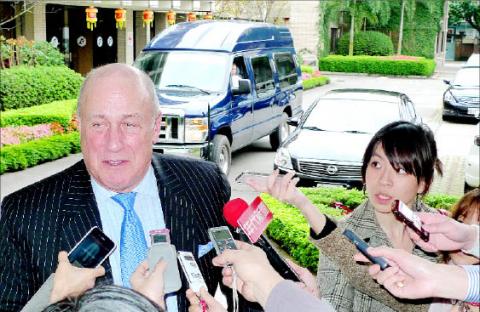
Photo: Lin Yi-chang, Taipei Times
A planned visit by Paal to Tsai’s campaign headquarters at 4:30pm was also canceled by the DPP.
Approached by reporters on his way to a meeting with Minister of Economic Affairs Shih Yen-shiang (施顏祥), Paal was asked about his remarks, which have been strongly criticized by the DPP and others.
“No interference in Taiwan’s election, none whatsoever,” he said as he refused to comment further on the candidates’ cross-strait policies.
“I think it’s all been reported. Thanks,” he added.
During an interview with CtiTV on Thursday, Paal said in response to a question about his views on the best policy choices for Taiwan in the coming four years that Taiwan “will suffer domestically” if the current relationship between Taiwan and China is damaged.
The Economic Cooperation Framework Agreement (ECFA) has barely begun to show results and Taiwan is on a very positive path in its current relationship with China from a security, diplomatic, economic and social development point of view, he said in the interview.
“It’s not ideal, it has many shortcomings, of course. But, if you look at the big picture: Europe is heading toward a serious economic slowdown, the US has three years or four years from a real economic recovery. Markets are not going to be available,” Paal said in the interview. “If Taiwan gets into the business of arguing and damaging its economic relationships with the mainland [China] or other trading partners, Taiwan is going to suffer domestically. The economic benefits for the young people will be disappearing.”
In the CtiTV interview, Paal praised the “creative formulation” of the so-called “1992 consensus” — the basis of Ma’s China policies — saying it created ambiguities for Taiwan and China to negotiate issues pragmatically, and he disapproved of the contention by the DPP and other critics that the formula undermines Taiwan’s sovereignty and would lead to unification.
“People in my circle that include a broad range of scholars and officials do not read it that way. This is one of the necessary compromises that states have to make with other states,” he said on Thursday. “It is beneficial for American interests. That’s first and foremost in our minds. We also think it’s beneficial for Taiwan’s relationship with China and for China’s with Taiwan.”
Paal also criticized the “Taiwan consensus” proposed by Tsai, saying the idea was “a way of saying [that Tsai has] no desire to reach cross-strait agreements.”
Paal added that the US and China did not accept this.
“Disruption of that [1992 consensus] could have unforeseen effects on the mainland [China] succession process, on tensions in the region and on our own election if high tension in the Taiwan Strait re-emerges during the course of the American election” scheduled for November, Paal said.
In response to Paal’s comments, AIT spokesperson Christopher Kavanagh said any statements Paal made were his “personal views” because he is “a private citizen” and no longer works for the AIT.
“Paal does not work for the US government and his statements do not represent US government policy,” Kavanagh said. “The US will be very happy to work with whoever the people of Taiwan elect as president.”
Paal was initially scheduled to visit the DPP yesterday afternoon, but the party called off the meeting after Paal’s comments and rescheduled it to today at 3:30pm. Tsai does not plan to meet Paal during his visit and Hsiao Bi-khim (蕭美琴), director of international affairs at Tsai’s campaign office, will act as Tsai’s representative.
Paal is also scheduled to visit Ma’s campaign office at 10:30am today. He met People First Party Vice Chairman Chang Chao-hsiung (張昭雄) on Thursday.
Responding to Paal’s comments, Hsiao told a press conference that Paal’s remarks were his own views and not the position of the US government.
It was not the first time Paal tried to collaborate with the KMT before a major election in Taiwan to influence voters, as Paal also made pro-KMT comments prior to the 2008 election, Hsiao said.
“Paal’s behavior was disrespectful to the Taiwanese public’s freedom of choice,” she said, adding that the KMT’s attempt to “play the endorsement card” with a former foreign officials was “immoral, somewhat childish and against standard diplomatic practice.”
The DPP had been in close contact with US officials in Washington and Taipei after Paal’s comments, she said, and the US reiterated that it would work with any candidate elected and that it respects Taiwan’s democracy.
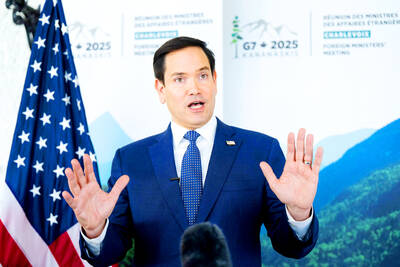
‘CROWN JEWEL’: Washington ‘can delay and deter’ Chinese President Xi Jinping’s plans for Taiwan, but it is ‘a very delicate situation there,’ the secretary of state said US President Donald Trump is opposed to any change to Taiwan’s “status quo” by force or extortion and would maintain that policy, US Secretary of State Marco Rubio told the Hugh Hewitt Show host on Wednesday. The US’ policy is to maintain Taiwan’s “status quo” and to oppose any changes in the situation by force or extortion, Rubio said. Hewitt asked Rubio about the significance of Trump earlier this month speaking with Taiwan Semiconductor Manufacturing Co (台積電) chairman C.C. Wei (魏哲家) at the White House, a meeting that Hewitt described as a “big deal.” Asked whether the meeting was an indication of the
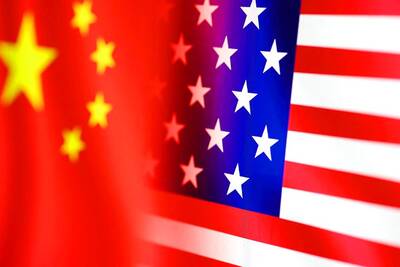
‘RELATIVELY STRONG LANGUAGE’: An expert said the state department has not softened its language on China and was ‘probably a little more Taiwan supportive’ China’s latest drills near Taiwan on Monday were “brazen and irresponsible threats,” a US Department of State spokesperson said on Tuesday, while reiterating Washington’s decades-long support of Taipei. “China cannot credibly claim to be a ‘force for stability in a turbulent world’ while issuing brazen and irresponsible threats toward Taiwan,” the unnamed spokesperson said in an e-mailed response to media queries. Washington’s enduring commitment to Taiwan will continue as it has for 45 years and the US “will continue to support Taiwan in the face of China’s military, economic, informational and diplomatic pressure campaign,” the e-mail said. “Alongside our international partners, we firmly
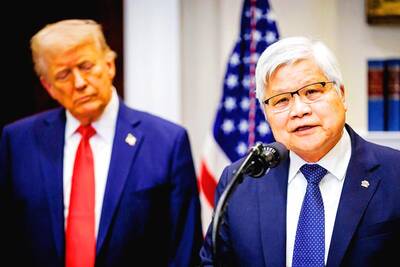
KAOHSIUNG CEREMONY: The contract chipmaker is planning to build 5 fabs in the southern city to gradually expand its 2-nanometer chip capacity Taiwan Semiconductor Manufacturing Co (TSMC, 台積電), the world’s biggest contract chipmaker, yesterday confirmed that it plans to hold a ceremony on March 31 to unveil a capacity expansion plan for its most advanced 2-nanometer chips in Kaohsiung, demonstrating its commitment to further investment at home. The ceremony is to be hosted by TSMC cochief operating officer Y.P. Chyn (秦永沛). It did not disclose whether Premier Cho Jung-tai (卓榮泰) and high-ranking government officials would attend the ceremony. More details are to be released next week, it said. The chipmaker’s latest move came after its announcement earlier this month of an additional US$100 billion
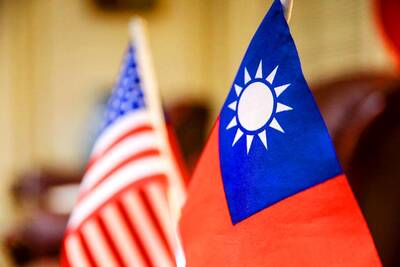
COUNTERING THE PLA: While the US should reinforce its relations with partners and allies, Taiwan must invest in strengthening its defenses as well, Phillip Davidson said If influence in the Indo-Pacific region is one of the US’ core interests, then Taiwan serves as a cornerstone of US economic and security influence in the region, former US Indo-Pacific Command commander admiral Phillip Davidson said on Thursday. “China’s ... strategy is to supplant the US leadership role in the international order ... and they’ve long said ... that they intend to do that by 2050,” Davidson told the National Review Institute’s Ideas Summit in Washington. Davidson said he had previously told US Senate hearings on China’s military activities and possible threats in the Indo-Pacific region that a Chinese invasion of